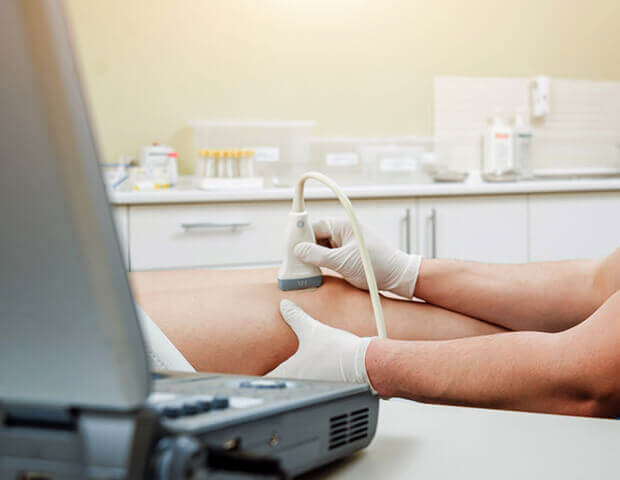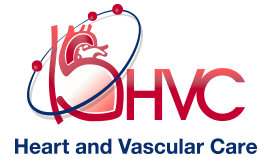Cardiovascular Tests
We can help anyone at risk for developing heart disease and those with established heart or blood vessel disease.
Diagnostic Testing
At Heart and Vascular Care, we only use state-of-the-art equipment and up-to-date procedures currently available for diagnostic testing and strive to provide our patients with services that are both convenient and comfortable for them. We understand that every patient is unique and suffers from varying degrees of pain and mobility. We offer a broad range of diagnostic testing methods available to further the understanding of disease, injury, and congenital or acquired abnormalities of the heart and blood vessels. Cardiology tests and procedures assist in the diagnosis and treatment of cardiac and vascular disease.
Electrocardiogram (EKG)
Upper Extremity Venous Ultrasound
Lower Extremity Venous Ultrasound
Aorta Ultrasound
Carotid Ultrasound
IVUS
Exercise Stress Test
Lower Extremity Arterial Doppler
Upper Extremity Arterial Ultrasound
Ankle Brachial Index
Iliac Vein Ultrasound
Renal Artery Ultrasound
Celiac Artery Ultrasound
Mesenteric Artery Ultrasound
Surgical Clearance
Protime Clinic
Pacemaker Clinic
ICD Clinic
Laboratory Services
Nuclear Stress Test
This is a test, performed in the office, involving either an exercise stress test on a treadmill or a chemical stress test that uses a medication to make your heart rate higher. Following the stress portion of the test, a nuclear medicine technologist will inject you with a radioactive tracer and images will be taken of your heart, allowing the physicians to see which areas of your heart receive enough blood and which areas do not. This test is safe and effective in the diagnosing of blockages in the coronary arteries.
Preparation
- Treadmill Nuclear Stress Test: Do not eat, drink or smoke six (6) hours prior to the test. Do not consume caffeine twelve (12) hours prior. Do not take any beta blockers, calcium channel blockers or nitrates one day, (24 hours), before the test unless otherwise instructed. Wear comfortable clothing and walking shoes. The test takes 2 to 3 hours as your heart is made to work harder by exercising on a treadmill or by using a chemical agent if you are unable to walk rapidly.
- Lexiscan Nuclear Stress Test (For those who cannot walk rapidly on treadmill): Do not eat, drink or smoke six (6) hours prior to the test – water is allowed. Do not consume caffeine twelve (12) hours prior. Do not take any theophylline or erectile dysfunction medications (24 hours) before the test unless otherwise instructed. Wear comfortable clothing. The test takes 2 to 3 hours as your heart is made to work harder by walking rapidly on a treadmill or using a chemical agent if you are unable to walk on a treadmill.
Heart and Vascular Care has been recognized for its high quality in echocardiography by the Intersocietal Accrediation Commision of Nuclear Cardiology (IAC).
Non-Nuclear Stress Test
These tests allow doctors to determine how well your heart functions when it is made to work harder. This is done by acquiring EKG and ultrasound images while you exercise on a treadmill. The test measures your heart’s health under the stress of physical activity. Your blood pressure and pulse are also monitored by a specially trained technician, an expert in using stress test equipment. The diagnostic testing aids in determining how fit you are and how safe an exercise program is for you, or if a heart problem exists. The stress EKG provides even more specific information about how your heart and coronary arteries are functioning.
Preparation
- Do not eat or drink three (3) hours prior to the test. Do not smoke at least six (6) hours prior. Do not take any beta-blockers or nitrates one day, (24 hours), before the test unless otherwise instructed. Wear comfortable clothing and walking shoes. The cardiology tests and procedures takes approximately forty five (45) minutes, and you will be walking on a treadmill.
Heart and Vascular Care in Metro-Atlanta has been recognized for its high quality in echocardiography by the Intersocietal Accrediation Commision (IAC).
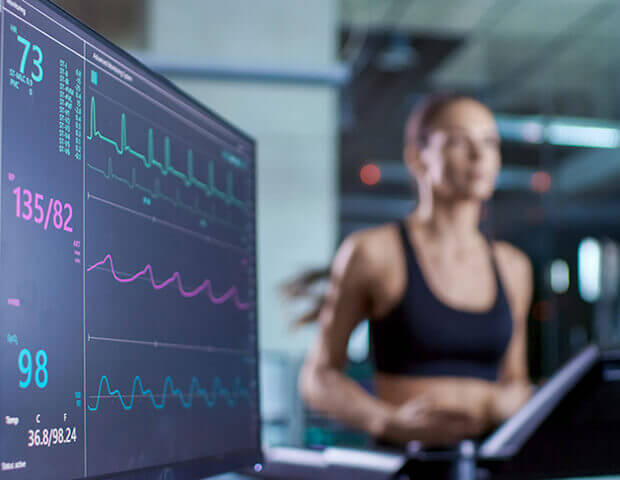
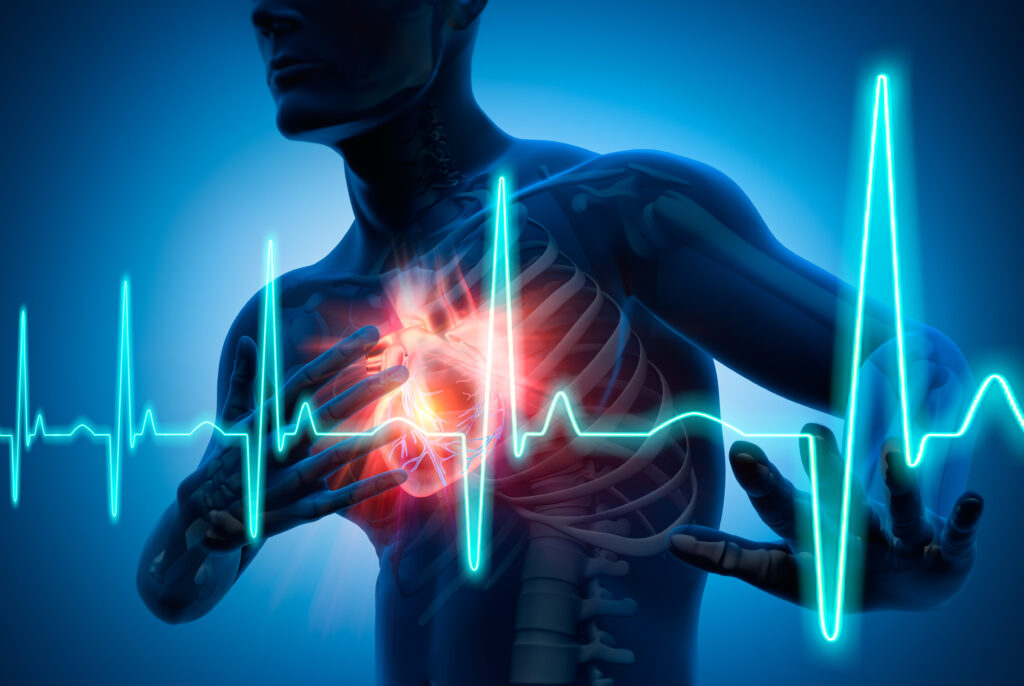
Calcium Score
Do you know your risk of developing heart disease or having a stroke? Heart attacks are caused by blockages or plaque in the arteries of the heart called coronary arteries. Heart attacks caused by coronary artery disease are the #1 cause of death in the United States.
Cardiologists can detect or screen for coronary artery plaque using a test called a calcium score or heart scan. This non-invasive test uses a CAT scan to measure the amount of calcified plaque in your coronary arteries. The test measures your “calcium score”, which helps your doctor calculate your long-term risk of developing coronary artery disease (CAD)- related events such as a heart attack. If there are blockages or plaque, called atherosclerosis, in the heart arteries then usually there is also a layer of calcium present, which is detected during the test. The blockages with their layer of calcium may not be severe but can still increase the risk for the patient having a heart attack.
Depending on the score your physician may order further testing or treatment, such as a stress test, heart catheterization, or prescribe medications such as aspirin or statins.
The CAT is done without any contrast injected into the body and take less than 10 minutes. It is typically not covered by insurance and is $99 for HVC Patients.
Coronary CAT Scan
A cardiac CAT scan or coronary CTA is a test that can examine the arteries of the heart. This is a new technology and previously the only way to directly look at the heart or coronary arteries was an invasive procedure called cardiac catheterization or coronary angiogram which has more risk. This test takes about 30 minutes. It is usually done at an outpatient imaging facility such as HVC’s Alpharetta office. The technician inserts an IV into the patient’s arm or hand. The patient lies on a table and goes through a large CAT scan camera that is like a large donut. This is different from a MRI which has a large tube and is more claustrophobic. Iodine based contrast is injected into the IV while the CAT scan machine is taking images. This takes less than one (1) minute. The technician processes the images using advanced computer software and the cardiologist will evaluate the images. This test involves a small amount of radiation. Also, the IV contrast can cause an allergic reaction so let the staff know if you have a history of iodine allergy, contrast allergy, or shellfish allergy. This is different than a Coronary Calcium Score because in that test no dye is injected so we cannot directly look at heart blockages.
Preparation
- Please bring a complete list of your medications on the day of your study.
- Write down any allergies you have, including medications or foods, and the specific reactions you have to each item.
- Any previous IV contrast (x-ray dye) you have had. Did you ever have any problems/issues?
- Advise us if you have asthma, wheezing, or any breathing problems, or have any problem with your kidney function.
- Let us know if you are or may be pregnant or if you are currently breastfeeding.
- If you take Viagra, Cialis or similar medications please inform us as you must stop this medication 48 hours prior to your procedure.
- 12 hours prior to your scan, discontinue taking any diet pills and caffeinated drinks such as coffee, tea, energy drinks or sodas.
- DO NOT EAT ANYTHING 4 HOURS PRIOR TO YOUR APPOINTMENT TIME.
- Please drink 16 ounces of water before your arrival. Arrive one (1) hour prior to your procedure time.
- Depending on your heart rate on the day of your study, you may be given medication to optimize the images This will result in additional time at our facility. It is best to prepare to be at AMI for between 1 and 3 hours.
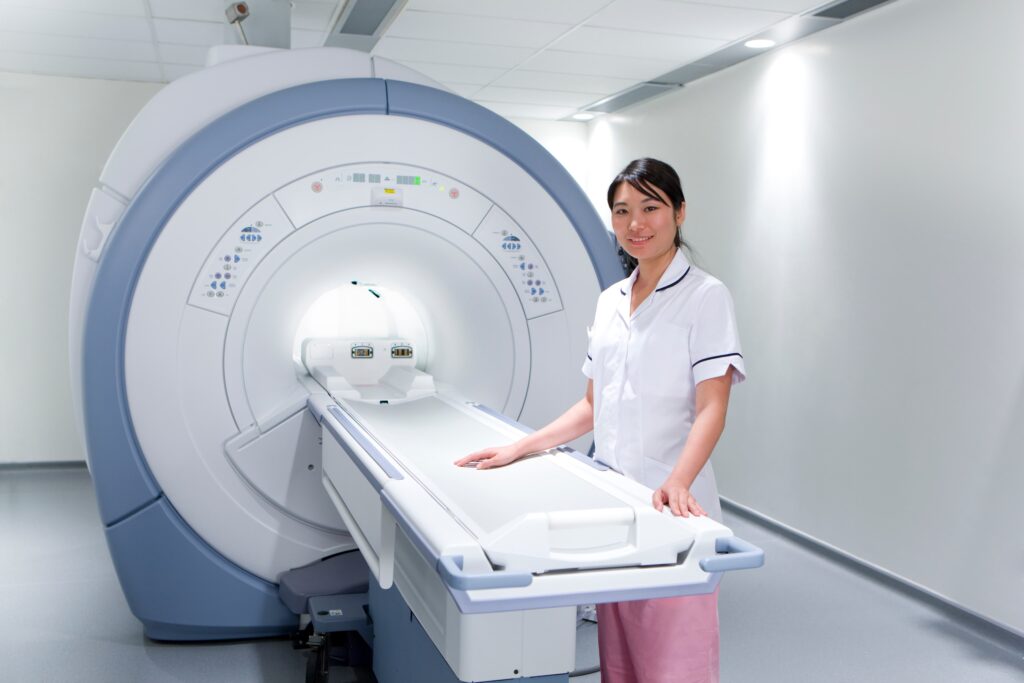
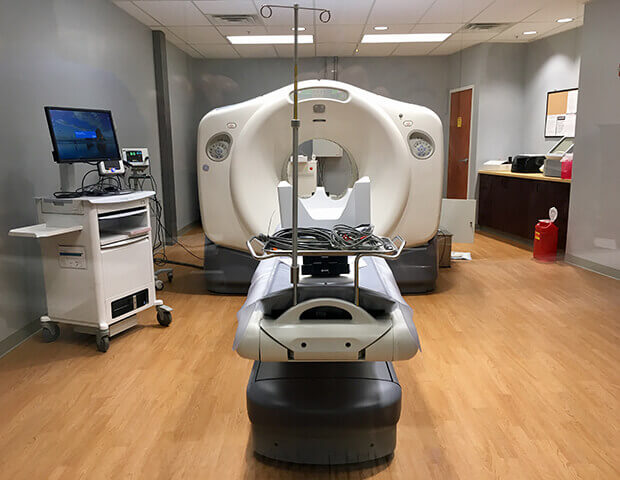
Cardiac PET Scan
Cardiac Positron Emission Tomography (PET) is a noninvasive procedure that can accurately identify areas of defect and determine the functional capacity of the heart. Cardiac PET can help improve the management of patients with known or suspected CAD, heart failure, and cardiac sarcoidosis.
Preparation: Do not eat or drink anything for at least six (6) hours prior to your test and no caffeine twelve (12) hours before your procedure. Do not smoke for at least six (6) hours prior to your test. Do not take any Beta Blockers, Nitrates, or Erectile Dysfunction medication one day (24 hours) before the scan unless otherwise instructed. If you have any questions regarding other medications, please contact our office.
Diagnostic Testing at Heart and Vascular Care has been recognized for its high quality in nuclear cardiology by the Intersocietal Accreditation Commission (IAC).
Stress Echocardiogram
This test also utilizes exercise stress on a treadmill and is followed by the visualization of the heart muscle using echocardiography. Depending on the movement of the heart muscle during stress, your physicians will decide on either the presence or absence of coronary artery disease and determine the need for further testing.
Heart and Vascular Care has been recognized for its high quality in echocardiography by the Intersocietal Accrediation Commision (IAC).
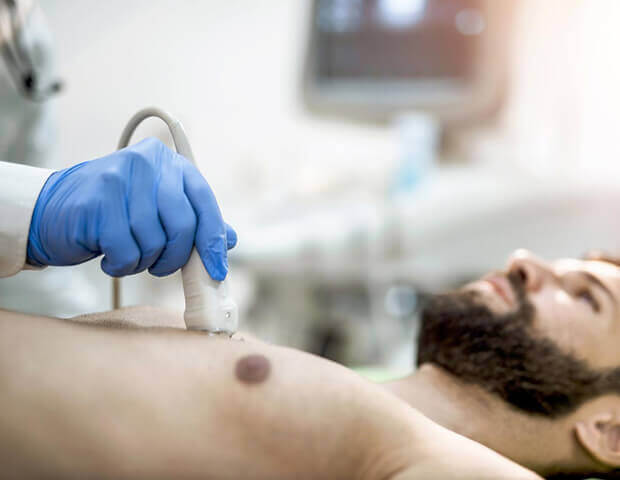
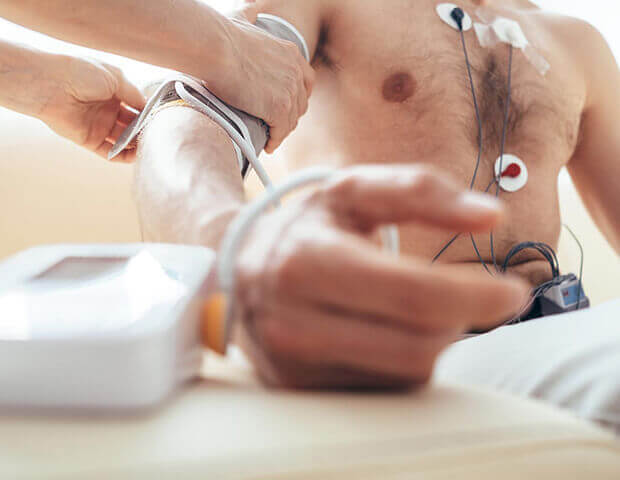
Echocardiogram
Examination of the heart’s size, pumping strength, valve function and the presence of blood flow through the use of ultrasound waves cardiology tests and procedures.
Diagnostic Testing Preparation
No special preparation is necessary. Patients will need to undress from the waist up and put on a short gown. The test should last approximately 30 to 45 minutes.
Heart and Vascular Care has been recognized for its high quality in echocardiography by the Intersocietal Accrediation Commision (IAC).
Holter/Event Monitors
These are medical devices that serve as portable ECG’s. The patient can wear these devices within the comfort of their own home, while the rhythm of their heart is constantly monitored and any changes or abnormalities are recorded for their physician’s review.
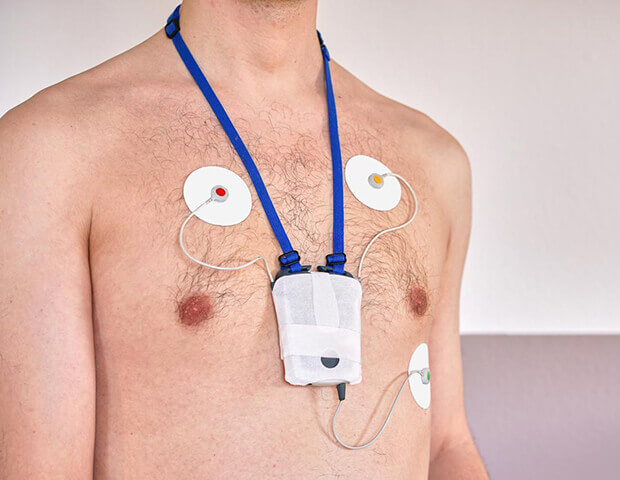
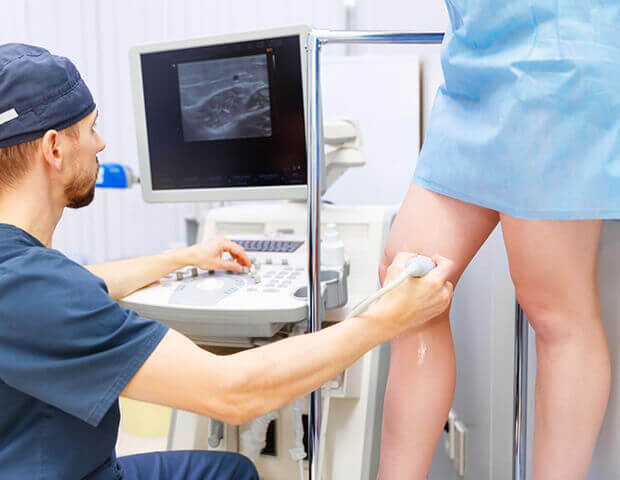
Venous Ultrasound
Technicians use ultrasound images to non-invasively evaluate the veins of the lower extremities, detecting venous reflux and blood clots in the legs. Venous reflux is the underlying cause of spider veins and varicose veins.
Preparation
Drink at least four (4) cups of water the morning of the ultrasound. Do NOT wear compression stockings 24 hours prior to the scheduled cardiology test and procedures. Wearing the compression stockings within 24 hours prior may invalidate the test results causing the test to be rescheduled. The test takes approximately forty-five (45) minutes. Be prepared to undress from the hip down.
Lower Extremity Arterial Ultrasound and Ankle Brachial Index (ABI)
Doctors look for blockages in the leg arteries using ultrasound waves and blood pressure cuffs on the leg.
Preparation
No special preparation is necessary. Patients will need to undress from the hip down.
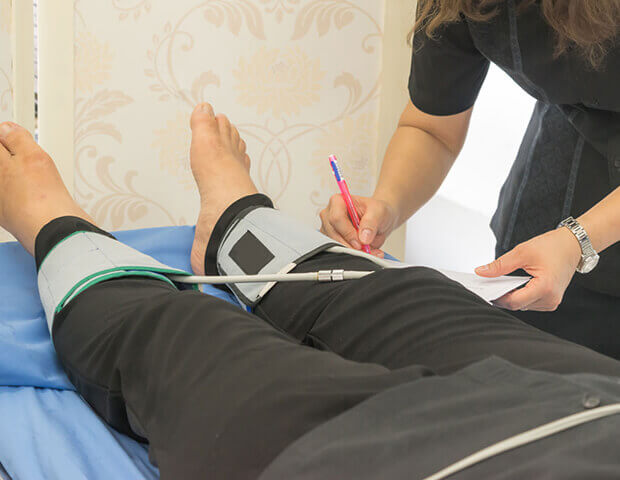
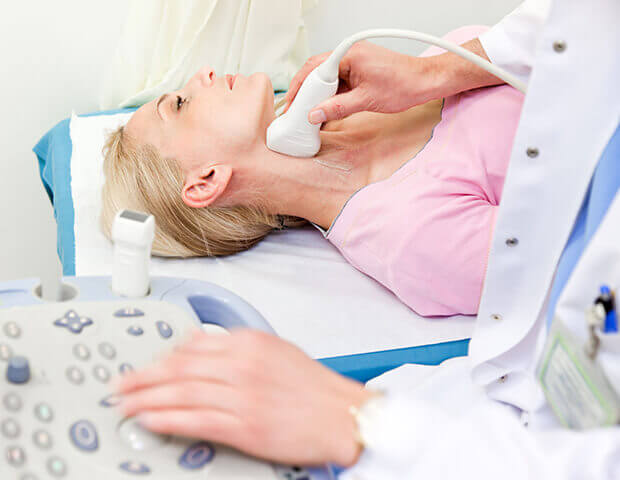
Clinical Cardiology Tests and Procedures
The specialists at Heart and Vascular Care offer comprehensive, office-based consultations and management of all symptoms and conditions affecting the cardiac and peripheral vascular systems. Our goal is to prevent and diagnose cardiovascular disease. To better serve our patients, we have several office locations which offer a range of services and diagnostic testing.
Heart and Vascular Care has been recognized for its high quality in echocardiography by the Intersocietal Accrediation Commision (IAC).
Abdominal Aortic Aneurysm
Doctors measure the size of your abdominal aorta and evaluate for an abdominal aortic aneurysm.
Preparation: Take 30 mL of milk of magnesia or Mylanta the night before the procedure. Do not eat or drink anything after midnight. Do not smoke for at least six (6) hours prior to your test. Wear a comfortable, two-piece outfit made of loose clothing. Please take all medication as prescribed. This cardiology test and procedure takes approximately thirty (30) minutes
Heart and Vascular Care has been recognized for its high quality in echocardiography by the Intersocietal Accrediation Commision (IAC).
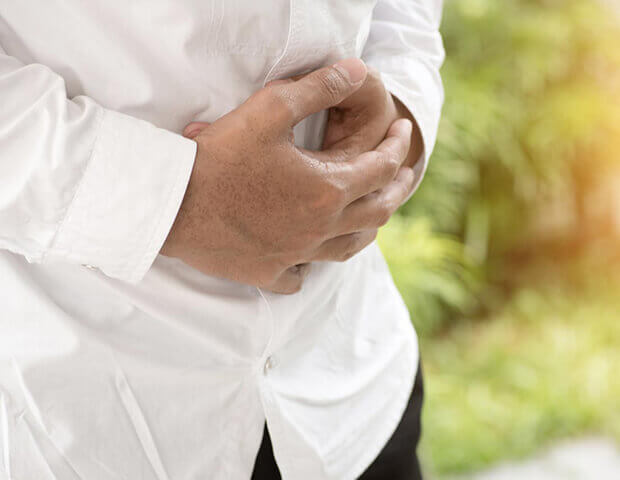

Carotid Ultrasound
Doctors use ultrasound waves to look for blockages in neck arteries.
Preparation: No special preparation is necessary.
Heart and Vascular Care has been recognized for its high quality in echocardiography by the Intersocietal Accrediation Commision (IAC).
Clinical Cardiology and Vascular Medicine Services
Cardiovascular Consultation.
Vascular Medicine Consultation.
Interventional Cardiology.
Endovascular Treatment of Peripheral Artery Disease.
Venous Disease Consultation.
Vein Phlebectomy and Sclerotherapy.
RF Ablation for Venous Reflux.
Preventive Cardiology.
Advanced Lipidology.
Clinical Electrophysiology.
Pacemaker and Defibrillator Clinic.
Remote/Home Pacemaker and Defibrillator Monitoring.
Cardiac Rehabilitation.
Congestive Heart Failure Management.
Hospital Procedures
For invasive procedures, you would be under the best of care with our physicians who have served as Directors of the Cardiac Catheterization Laboratories at Northside Hospitals Forsyth and Cherokee where they pioneered coronary angioplasty and stenting. Our specialists perform the following procedures at Northside Hospital Forsyth, Northside Hospital Cherokee, Emory Johns Creek Hospital, and St. Joseph’s Hospital of Atlanta.

Endovascular Procedures
The physicians at Heart and Vascular Care perform endovascular procedures to treat peripheral artery and venous disease at our office-based Vascular Lab in Cumming, Georgia. We offer patients and their families a comfortable and easily accessible location for their procedures.
